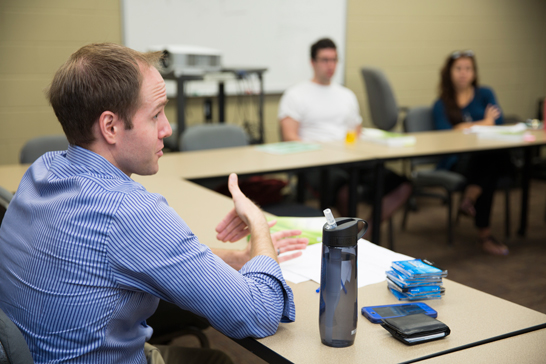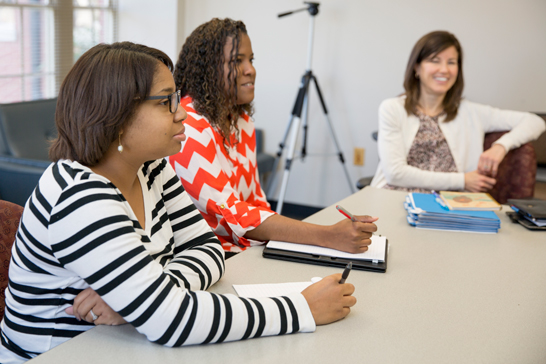The doctoral training program in clinical psychology at The University of Alabama was founded in 1959 and is based on the scientist-practitioner (Boulder) model. The program has been continuously accredited by the Commission on Accreditation of the American Psychological Association since 1959.

The department has awarded more than 700 PhD degrees in the past 60 years; approximately 75 percent of those have been in Clinical Psychology. Graduates from the program function in a variety of settings as teachers, researchers, providers of clinical services, and policymakers, holding positions of leadership and service in the Southeast and nationally.
The program emphasizes the integration of scientific knowledge and the professional knowledge and skills needed to function as a clinical psychologist in academic, research, or clinical settings.
Clinical coursework is begun during the first year and continuous practicum and research opportunities are provided throughout the training experience. Program unity is achieved through core experiences required of all clinical students. Diversity of training experiences is also encouraged and available through specialty training, electives, placements, and research activities.
A full-year pre-doctoral clinical internship is required of all students. Although application during the fourth or fifth year is typical, students are eligible to begin applying to internship sites in their third year of residency assuming all coursework will have been completed by the end of that year. See Student Admissions, Outcomes, and other Data for a list of internship programs students from the past 10 years have completed.
The clinical orientation of the clinical training program may be described as eclectic with an emphasis on cognitive-behavioral and interpersonal process approaches.
Our program aims include the following:
Aim 1: Acquire a general knowledge base in the discipline of psychology, broadly construed.
Aim 2: Develop profession-wide competencies as part of preparation for practice in health service psychology.
Aim 3: Develop the knowledge, skills, and competence sufficient to produce new knowledge, to critically evaluate and use existing knowledge to solve problems, and to disseminate research.
Aim 4: To promote professional values, attitudes, and behaviors (including communication and interpersonal skills) that are critical for practice in health service psychology.
For additional information about the Clinical Psychology Program, see the Clinical Training Manual and Appendices.
Clinical Subareas
The Clinical program has four subareas that build on faculty strengths and departmental resources:
Graduate Studies Minors
The Department of Psychology at The University of Alabama offers a Statistics Minor and a Neuroscience Minor for graduate studies.
Training Facilities
Psychology Clinic
The Department of Psychology and the College of Arts and Sciences support a full-service Psychology Clinic that serves as the primary training facility for clinical doctoral students. The Clinic serves as a psychological resource agency for the University of Alabama campus and broader community. Under the supervision of licensed clinical psychologists, students offer comprehensive psychological evaluations, psychotherapy, and psychological consultation.
Community Training Facilities
The Tuscaloosa area is unusually rich in health and mental health resources particularly in relation to its size. For many years, Tuscaloosa has been considered the mental health center of the State of Alabama primarily based on the presence of three major psychiatric hospitals. These facilities have been cornerstones of training during the 60-year period that this department has engaged in doctoral education.
The University of Alabama Autism Spectrum Disorders (ASD) Clinic is a combined effort between the Department of Psychology and the Department of Communicative Disorders. Services include diagnostic evaluations and treatment (e.g., individual therapy, school consultation, and social skills groups) for individuals from 18 months to adulthood. The University of Alabama Autism College Transition and Support Program (UA-ACTS) provides academic, social-emotional, and daily living skills support for college students with ASD.
Taylor Hardin Secure Medical Facility is a forensic hospital that interfaces with the psychology and law subarea. Services include comprehensive psychiatric evaluations and individual and group psychotherapy for competency restoration and managing symptoms of psychiatric disorders. Advanced students may co-conduct forensic evaluations for the courts (competence to proceed, sanity) and competence restoration through the Alabama Forensic Assessment and Research Evaluation Project (Alabama FARE) under the supervision of Dr. Cox.
Other clinical sites with which the program has ongoing relationships include the University Medical Center, with clinics in Pediatrics, Family Medicine, Geriatrics, Psychiatry, and Emergency Services; Bryce Hospital (inpatient psychiatric state hospital for adults); Mary Starke Harper Geriatric Psychiatry Center (inpatient psychiatric state facility for adults aged 65 and older); The University of Alabama Student Counseling Center; Tuscaloosa VA Medical Center; Alabama Neurology & Sleep Medicine; The Wise Center for DBT; and University of Alabama at Birmingham Pediatric Neuropsychology Clinic. In most facilities, paid supervised placements have been developed for advanced students. All placements are supervised by a licensed psychologist holding either full-time or adjunct faculty status.
Financial Assistance
In addition to numerous paid clinical stipends at the above-noted facilities (primarily reserved for third- and fourth-year students), the department offers teaching and research assistantship stipends (minimum $15,840) during the academic year and fellowships for highly qualified applicants and current students ($20,000). Placements also provide partial or full tuition coverage (i.e., tuition grant) and student health insurance. Research grant support is increasingly available. All clinical students admitted to the program receive some type of financial assistance.
Students who are admitted to the graduate program receive a letter of offer specifying the financial assistance to be offered. In most cases, students are offered the equivalent of four years of financial assistance, including a tuition grant for the academic year. In most cases, students also receive financial assistance beyond their 4th year. See Funding for additional information.
Tuition and Fees
View current graduate tuition rates
Arts & Sciences Course Fee: $15.00 per credit hour
Tech/Facility Fee: $12.00 per credit hour
Admissions Goals and Student Characteristics
The student body of the clinical graduate program comprises a diverse set of students. Currently, there are 56 clinical students on campus and 8 pre-doctoral interns. Fourteen clinical PhDs were awarded in 2022-2023.
Though adhering to fairly rigorous admission standards, the department encourages diversity in terms of background and other demographic factors. Entering students include those fresh from undergraduate programs, those with recently completed master’s degrees, and several who have significant work experience. The clinical program and the department as a whole actively recruit students from underrepresented backgrounds.
For the 2023-2024 academic year, 15 students were admitted. Student admissions data for the past several years reflects the caliber of student that we attempt to attract. The average grade point average for entering students is approximately 3.8.
Students represent a diverse profile ranging from those with more direct clinical interest to those with teaching and research career orientations. These students share a common curriculum and have access to the same support and placements. Many choose additional experiences or placements that are in line with their career choices. We seek students who have enthusiasm for both research and applied interests.
Data for Applicants
 Data for entering clinical psychology classes can be found at Student Admissions, Outcomes, and other Data and Other Data, in compliance APA Implementing Regulation C-26.
Data for entering clinical psychology classes can be found at Student Admissions, Outcomes, and other Data and Other Data, in compliance APA Implementing Regulation C-26.
The minimum GPA required for regular admission is 3.0. However, successful applicants typically exceed this minimum. Conditional admission may be granted if GPA is below 3.0 but other credentials are outstanding.
Undergraduate courses required for consideration for admission include Introductory Psychology, Elementary Statistics, and Research Methods.
Diversity Statement
We at the psychology department at The University of Alabama are devoted to promoting diversity in all forms including ethnicity, gender, sexual orientation, national origin, culture, age, and socioeconomic status. We pride ourselves on maintaining a collaborative atmosphere, and minority students are strongly encouraged to apply to our program. The department realizes that the interview process can be quite expensive and may interfere with an applicant’s ability to apply to programs in which they are otherwise qualified. Therefore, we are willing to help qualified minority applicants with the costs associated with interviewing here at UA.
Diversity is integrated throughout the activities of our program including components of research, clinical activities, coursework, and service opportunities. Research projects focusing on providing services to or documenting the experiences of minority populations are especially encouraged. Additionally, minority students are provided with the necessary support to apply for special grants and fellowships to fund their graduate work.
Clinical students are taught to incorporate the various aspects of their client’s identity into case conceptualizations in order to provide care that is culturally appropriate. Tuscaloosa is home to many unique clinical placements due to its proximity to several psychiatric hospitals. The Mary Starke Harper Center, Bryce Hospital, and the Taylor-Hardin Secure Medical Facility all provide students with the opportunity to work with rural and/or forensic patients of different ages and with different psychological diagnoses.
Furthermore, graduate students regularly work with various organizations on campus to support the needs of the diverse population. Previous students within our department have worked with LGBTQ+, racial/ethnic minorities, and international undergraduates and graduates. Throughout their graduate careers, our students are actively encouraged to question their own biases and develop the cultural competency skills necessary to become successful psychologists.
Resources
Interested in clinical psychology? The following links may be of interest:
- General facts about grad school in clinical psychology (PDF)
- Careers in Psychology
- Clinical Psychology Graduate School Guide to Getting In
More Information
For further information about the program and the application/admissions process, please see our Admissions Instructions or the UA Graduate School.